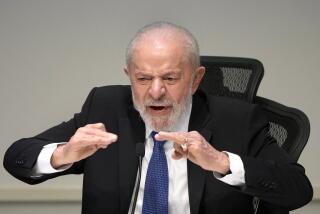Polls Favor Cardoso in Brazilian Voting : Election: Ex-finance minister may avoid runoff in presidential race. He is credited with halting runaway inflation.
- Share via
SAO PAULO, Brazil — Fernando Henrique Cardoso, the man credited with halting Brazil’s decade-long runaway inflation--at least for now--was poised Monday to become the nation’s second democratically elected president in three decades.
As the 94 million registered voters headed to the ballot boxes, Cardoso, candidate of the Brazilian Social Democratic Party, was heavily favored by every national poll to capture the presidency.
A final poll by Datafolha released Sunday projected that the 63-year-old sociologist and former senator would capture more than 50% of the vote and avoid a November runoff with projected runner-up Luis Inacio (Lula) da Silva, a former union leader and candidate of the left-leaning Workers’ Party.
The first official tallies are not expected until this afternoon. Final official results will not be complete for at least five days. If they show that Cardoso did not get more than 50% of the vote, he could face Lula, as Da Silva is universally known, in a Nov. 15 contest.
Cardoso--an author, a former ambassador to the United States and, briefly, a political exile during the country’s 21-year military dictatorship--swept to the front of a field of eight presidential hopefuls atop a wave of support for an economic plan he devised while serving earlier this year as the country’s finance minister.
Following the commencement in July of his Real Plan--which included the introduction of a new currency, the real--inflation dropped from 50% in June to 6% in July and less than 1% in August.
As the nation’s economy stabilized, voters turned quickly away from Lula, once the leading candidate, and toward Cardoso.
“By voting for him,” said student Virginia Goas, 20, after casting her vote for Cardoso in Sao Paulo, “it guarantees that the plan will continue to work.”
Mateus Helio of Sao Paulo also voted for Cardoso. “He’s stabilized Brazil,” said the 54-year-old composer. “That hasn’t happened in a long time. He deserves to be president.”
If elected, Cardoso will be the second popularly elected president since 1964, when a military dictatorship took power. The military ruled until 1984, when Jose Sarney was installed as president through a parliamentary process. Fernando Collor de Mello became president in 1989 following national elections but was impeached three years later on corruption charges and succeeded by his vice president, Itamar Franco.
Monday’s elections were the biggest in Brazil’s history, with voters choosing not only a new president but also hundreds of members of Congress, two-thirds of the Senate, all 27 governors and 1,500 state legislators.
In major cities such as Rio de Janeiro, Sao Paulo, Salvador and Belo Horizonte, voters waded to the polls on streets littered with election pamphlets, posters and papers distributed by hand, thrown to pedestrians from passing cars or rained down like confetti from office buildings during the final days of the campaign.
Voting is mandatory in Brazil for residents aged 18 to 70. Those 16 and 17 can vote if they desire. Monday was declared a national holiday to assure voters time to go to the polls.
“This campaign has been really great” because it has avoided mudslinging, Cardoso told reporters in Sao Paulo as he headed to his polling place.
Lula, 48, denounced the election as “illegitimate” after casting his vote in an industrial suburb of Sao Paulo. Cardoso, he said, was boosted by big business, the media, the Franco government and the distribution of fraudulent sample ballots.
More than 12 million incorrect sample ballots used to educate voters before the election were found in the possession of Cardoso’s party and in the offices of two other parties with which he has formed alliances.
On the ballots, Lula’s name appeared third instead of fourth, as it appears on the official ballot. Lula said the incorrect position would confuse millions of illiterate voters who had been taught to vote according to the position of the candidate’s name on the ballot.
Election officials and members of Lula’s party said they will be watching the vote tabulations carefully to see how many votes Carlos Gomes receives that could have been intended for Lula. Gomes, who is third on the ballot, is projected to receive only 3% of the vote.
Election officials will also be watching the vote tallies in the newly formed state of Tocinas, where, in 70 of the state’s 123 cities, there are more registered voters than there are people. State election officials launched a belated investigation Friday.
The government on Monday sent troops to 12 states to maintain order, but a Superior Electoral Court spokeswoman said there had been no reports of violence or fraud.
Twenty-six members of Lula’s party were arrested in the state of Santa Catarina, however, for campaigning too close to an election site, and voting was temporarily stopped at a balloting site in Rio de Janeiro when a gun battle broke out nearby between police and drug traffickers.
More to Read
Sign up for Essential California
The most important California stories and recommendations in your inbox every morning.
You may occasionally receive promotional content from the Los Angeles Times.












